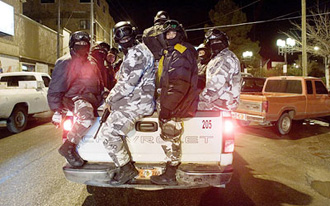 |
 |
 |
 Editorials | Issues | November 2007 Editorials | Issues | November 2007  
Bush Announces $1.4 Billion Drug Plan For Mexico
 Laurence Iliff - The Dallas Morning News Laurence Iliff - The Dallas Morning News
go to original


| | The media have informally dubbed the security initiative "Plan Mexico" in reference to "Plan Colombia," in which billions of U.S. dollars have supported that nation's fight against drug traffickers and leftist insurgents. |
Backers say proposal opens dialogue; foes wary of U.S. military

Mexico City – A proposed $1.4 billion aid package to Mexico announced by President Bush on Monday would provide helicopters and planes to fight drug traffickers, but most important, would create a new security relationship between the two nations, U.S. and Mexican officials said.

Mr. Bush included the first $500 million for Mexico in a $46 billion supplemental budget request that would go mostly for military operations in Iraq and Afghanistan. An additional $50 million would go to Central America.

U.S. congressional leaders said the proposal, given its packaging with funds for the controversial Iraq war, won't get a vote before the end of the year.

"Not only are we putting before Congress a good security package focused on fighting drug trafficking, organized crime, weapons trafficking and trafficking of people, but I also think that we are creating a formal mode of cooperation and dialogue with Mexico and Central America that could pay big dividends in the future," Thomas Shannon, assistant secretary of state for Western Hemisphere affairs, said in a telephone briefing from Washington.

Currently, about $40 million of U.S. aid goes to Mexico annually.

The "Merida initiative," named for the city where President Bush and Mexican President Felipe Calderón first discussed the plan in March, was designed to address Mexico's concerns about sovereignty and will not increase the limited number of U.S. law-enforcement agents operating south of the border, Mr. Shannon said.

President Bush, who spoke by phone with Mr. Calderón early Monday, said the initiative "delivers vital assistance for our partners in Mexico and Central America."

U.S. Ambassador to Mexico Tony Garza said the plan "is the single most aggressive undertaking ever to combat Mexican drug cartels and the associated violence they pose to citizens in both the U.S. and Mexico."

The Mexican Foreign Relations Ministry said Mr. Calderón's government "recognizes the commitment of President Bush's government ... to take bilateral cooperation to a new level."

The media have informally dubbed the security initiative "Plan Mexico" in reference to "Plan Colombia," in which billions of U.S. dollars have supported that nation's fight against drug traffickers and leftist insurgents.

Unlike Plan Colombia, however, no U.S. military advisers would be allowed in Mexico.

Leftist politicians in Mexico have said they believe the U.S. will insist on some direct participation on Mexican soil.

Cuauhtémoc Sandoval Ramírez, a member of the lower house of Congress for the Party of the Democratic Revolution, said earlier this month that the initiative "definitely will put us on the first line of U.S. security where we will have to accept military advisers, officials and private contractors."

Mexican officials have said the plan would provide items the government can't afford on its own, such as surveillance planes, helicopters, communications equipment and dogs to sniff out drugs and cash.

U.S. Congress members had not been formally briefed on the Merida initiative, and several said they were waiting for more information before taking a stand.

Sen. Kay Bailey Hutchison, R-Texas, said she would work with the White House to ensure "adequate funding" for the effort.

"Senator Hutchison believes it is of the utmost importance that we secure the United States and protect the Western Hemisphere," spokesman Matt Mackowiak said. "These criminals cross our borders and threaten Texans by doing inestimable damage to our communities."

Staff writers Todd J. Gillman in Washington and Alfredo Corchado in New York contributed to this report. | 
 | |
 |



